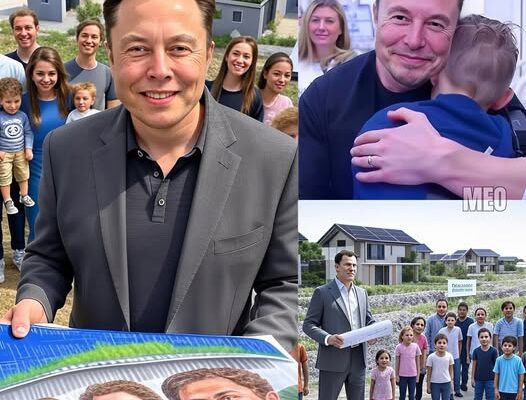Elon Musk’s Alleged $5 Million Housing Pledge: Visionary Act or Viral Misinformation?
In a development that has drawn widespread attention, billionaire entrepreneur Elon Musk is reported to have pledged $5 million to fund the construction of affordable housing for low-income families. Announced in early 2025, the initiative is said to promote sustainable communities in underserved areas, aligning with Musk’s long-standing emphasis on innovation and eco-friendly solutions. As of 3:10 PM (+07) on Wednesday, June 18, 2025, the story continues to generate buzz online—though mounting skepticism has prompted a deeper investigation into the claim’s origins, legitimacy, and potential impact.
The Claim and Its Appeal
The story first emerged in late March 2025 via social media posts and online articles that claimed Musk had invested $5 million into building affordable homes. The supposed initiative focuses on sustainability—emphasizing energy-efficient architecture and renewable energy technologies—to provide stable housing in regions facing severe shortages.
Supporters praised the alleged move as a meaningful step toward social responsibility, pointing to Musk’s $250+ billion net worth and his known commitment to sustainable innovation through ventures like Tesla and SpaceX. The promise of eco-conscious communities, equipped with green spaces and solar-powered features, offered an inspiring vision of future housing—one not only affordable, but environmentally progressive.
Questioning the Narrative
Despite the positive reception, closer scrutiny has raised serious doubts about the claim’s authenticity. The original reports can be traced to a March 29, 2025 article published by sites such as news.autodailyz.com, which outlined detailed—but unverified—plans for the project. However, fact-checking organizations like Snopes and Check Your Fact have since flagged the reports as false and AI-generated. Tools such as GPTZero and QuillBot confirmed the content lacks original sources and shows clear signs of machine authorship.
Further investigation reveals no official statement from Musk or his companies, no announcement on his verified X (formerly Twitter) account, and no coverage from established media outlets. For a figure as prominent as Musk, such a philanthropic gesture would likely be widely reported. The complete lack of corroboration strongly suggests the story may be a product of misinformation or even digital satire, possibly boosted by Musk’s polarizing reputation and the increasing prevalence of AI-generated content in 2025.
Musk’s Actual Involvement in Housing
Some confusion may stem from Musk’s association with Boxabl, a Las Vegas startup that produces compact, modular homes. Musk publicly acknowledged owning a $50,000 Casita model, used as a guest home near SpaceX’s Texas site. While Boxabl has pursued contracts for military and industrial use—such as at Guantánamo Bay—there’s no indication of its involvement in affordable housing for low-income families.
Moreover, Musk has not personally invested substantial funds into the company or its humanitarian applications. Regulatory filings mention his ownership, but there is no evidence supporting a $5 million outlay toward housing initiatives.
Philanthropy and Policy Contradictions
Musk’s charitable arm, the Musk Foundation, donated $160 million in 2023, primarily to education, healthcare, and climate causes. However, none of its publicly known grants have supported housing for underserved families.
Complicating the narrative further is Musk’s recent appointment to the Department of Government Efficiency (DOGE) under the Trump administration. According to a New Republic article dated March 12, 2025, this agency has been linked to cuts in affordable housing programs—including the rollback of the $1 billion Green and Resilient Retrofit Program. This policy stance directly contradicts the idea that Musk is investing new funds into such efforts, casting further doubt on the $5 million housing story.
Public and Community Response
Online reaction to the claim has been sharply divided. Supporters on X hailed Musk’s supposed generosity, with some praising the visionary nature of sustainable housing for the poor. One user wrote, “If anyone can fix housing, it’s Elon.” Critics, however, were quick to label the story as fabricated, citing the lack of evidence and clear signs of AI authorship. “Another fake Musk myth,” one commenter warned, underscoring growing public skepticism toward unverified digital narratives.
For communities struggling with real housing shortages—like those in Washington State, which faces a deficit of 230,000 units according to a 2024 report—the claim has offered a glimmer of hope. But housing advocates, including those from the National Low Income Housing Coalition, emphasize that optimism alone is not enough. Without project details, confirmed sites, or legitimate funding sources, the initiative remains purely speculative.
Broader Implications for Industry and Society
Had the claim been true, Musk’s investment could have signaled a broader shift in how billionaires approach social issues—particularly if it inspired others to pursue similar initiatives. The sustainability angle might have accelerated the adoption of green construction practices, nudging the housing industry closer to climate-aligned goals.
However, a $5 million contribution—while significant—pales in comparison to the estimated $1 trillion housing gap in the U.S. It would take major scaling to generate meaningful impact.
Meanwhile, the rumor echoes another recent unverified report: Musk’s supposed partnership with Mel Gibson and Mark Wahlberg to create a $1–3 billion film studio. That claim, too, remains unsubstantiated and fits a growing pattern of high-profile but unverified stories circulating online. With Musk’s ventures historically opaque and often supported by large government subsidies (like the $38 billion Tesla has received), questions around transparency and credibility persist.
Obstacles and Doubts
The biggest hurdle is verification. No credible sources support the housing claim. No site plans, construction timelines, or land purchases have been made public. And Musk’s characteristic silence on such viral rumors leaves the narrative unanchored.
Adding to the skepticism is the contradiction between this alleged generosity and Musk’s political alignment with cost-cutting government reforms. Critics also question whether, if the investment were real, it would be motivated by philanthropy or tax incentives. The claim bears strong resemblance to prior misinformation—like the debunked story about $10,000 Tesla homes—highlighting the growing influence of AI in distorting public discourse.
Looking Ahead
As of June 18, 2025, the claim remains unresolved. A single confirmed announcement—be it a Musk tweet, a land acquisition, or a formal partnership—could transform the story from rumor to reality. But in the absence of such proof, the silence speaks volumes.
At its core, the narrative reflects a clash between aspiration and authenticity. If true, it could inspire a new era of sustainable, equitable housing. If false, it serves as yet another warning about the dangers of viral misinformation in the AI age.
Until the facts surface, the story remains suspended—caught between digital illusion and public longing for meaningful change.



